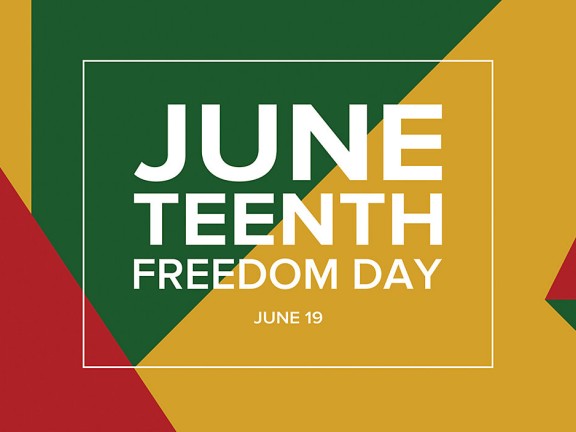Juneteenth is Saturday 6/19

A significant day in the history of the United States, Juneteenth, is upcoming and often misunderstood or forgotten completely. This holiday persists as a joyous reminder of what Black people have overcome and a solemn remembrance of the lives destroyed by centuries of oppression. Recently, structural racism has been under deep examination in the United States, including how inequities exist today as direct extensions of the brutal slavery Juneteenth celebrates the end of. In celebration, we are sharing some basic information about Juneteenth and offering resources to learn more.
If you find yourself with questions about how the legacy of slavery led the nation to this current national conversation, we would strongly recommend you watch Ava Duvernay’s 2015 Academy Award-nominated documentary 13th, which is currently streaming for free on YouTube.
What is Juneteenth?
Juneteenth is a portmanteau of June 19, the day in 1865 when slaves were freed in the state of Texas. It’s also known as Emancipation Day, Freedom Day, and Jun-Jun. The message was delivered to Galveston, Texas by U.S. General Gordon Granger.
Why is it significant?
Specifically, Juneteenth marks the day when word arrived in Texas that slaves had been freed – more than two years after slaves were officially freed in the south by the Emancipation Proclamation on January 1, 1863. Reasons for the delay are not precisely known, but often indicate that news may have been deliberately delayed by wealthy landowners seeking additional harvests from slave labor or that the original messenger was killed.
When and how is it celebrated?
Juneteenth is celebrated on different days in various states due to when slaves’ liberation was enforced (some on January 1). East Texas, Oklahoma, Louisiana, southwestern Arkansas, southern Oklahoma, and California observe it on June 19. During the 1960s, celebrations declined due to integration efforts of the Civil Rights Movement, but Juneteenth began to receive greater recognition again in the 1970s. Efforts have been made to declare Juneteenth a national holiday. Celebrations often include events and activities such as games, barbecues, beauty pageants, talent contests, and sporting events. More generally, Juneteenth is a day to celebrate Black pride and Black achievements.
What I can I do to honor and acknowledge this day?
Read and learn more about Juneteenth (links below) and consider how slaves receiving freedom did not equate with them being free. Celebrate, but consider what it means to respectfully acknowledge this day if you are not a Black person.
Further Reading
- Why there is a movement for reparations
- Learn About Juneteenth with Alexandria’s Black History Museum Director
- Parks, K. A. (2014). Juneteenth Celebration. In C. A. Gallagher & C. D. Lippard (Eds.), Race and Racism in the United States: An Encyclopedia of the American Mosaic includes a section entitled "Juneteenth Celebration" Kathrin Parks
- Holiday Symbols and Customs by Keith Jones includes a chapter on Juneteenth
2021 Local Juneteenth Events
- May 30 – July 5: Chester County's Voices Underground Juneteenth Festival
- June 17 - 21: Juneteenth with the Museum of American Revolution
- June 18: Jeffersonian Picnic: All Men Created Equal?
- June 19: Juneteenth Celebration at the African American Museum
- June 19: Juneteenth at the National Constitution Center with Free Admission
- June 19: Philadelphia Juneteenth Parade and Festival
- Several more local events to celebrate Juneteenth can be found here


